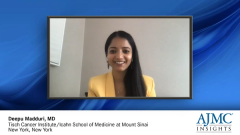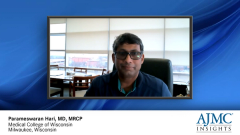
RRMM Treatment Decisions and Use of CAR T-Cell Therapy
Drs Deepu Madduri, Parameswaran Hari, and David S. Siegel discuss the types of data that factor into their treatment decisions for patients with relapsed/refractory multiple myeloma.
Episodes in this series

Deepu Madduri, MD: What excites me about CAR [chimeric antigen receptor] T-cell therapy for patients with relapsed/refractory multiple myeloma [RRMM] is that we’re able to offer a one-time treatment and get deep, durable responses.
This is exceptional because for these patients with RRMM, who have a median overall survival of less than 12 months, we’re offering therapy as a one-time treatment, where they’re not coming into the clinic every week to get infusions and chemotherapy.
A lot of our patients are grateful to not have chemotherapy because they feel like they’re living their life again. They got their life back. They’re not tethered to an IV [intravenous infusion] pole, and they get to live their life, where they are traveling and going places. They feel like they’ve gotten a whole bunch of life back that they’ve missed during chemotherapy almost every week for these therapies.
Parameswaran Hari, MD, MRCP: In decision-making for a patient, we must look at all of this: real-world data, cost-effectiveness for the patient, the institution, the payer, and the clinical utility. For us as physicians and for patients as recipients of care, I would place the clinical utility—which is the ratio between the efficacy of the medication or drug, or procedure, versus the perceived risk to the patient—as the No. 1 concern. If I have a safe and effective therapy that I know will produce a long remission in a patient or a very long overall survival with very little risk of toxicity, I will place that above all other considerations. From there, the challenge becomes how can we manage that with the other considerations, which are a little extraneous to the medical situation.
Once we place the medical situation paramount, we then try to get payer approval, or to work within the logistics of the approval, so that we do as much in a very cost-effective fashion. For example, many centers have come up with outpatient delivery of care so that inpatient cost, which is a significant part of the overall hospital cost, can be monitored. Notably, some of the CAR T complications, such as CRS [cytokine release syndrome], which is a fever and an infection-like syndrome without an actual infection, can be managed by on an outpatient basis. Outpatient management tends to reduce the costs of overall health care delivery because hospitals tend to be very expensive places, and we as well as many others are trying to do as much care on an outpatient basis as possible, so that more patients can receive this care.
David S. Siegel, MD, PhD: Using CAR T cells in earlier lines is not very different than other therapies that we have used. Most of the time, we develop new therapies in patients who don’t have a lot of options. We figure out that this looks like an interesting therapy, and once we understand it, we start to move it earlier in the spectrum of things that we do, with the hopes that it will have a more profound and long-lasting effect in a less heavily pretreated patient.
The same thing is going to happen is going with CAR T cells. I can tell you there are already ongoing conversations with the various sponsors of CAR T-cell studies to ask exactly those things and using CAR T cells earlier during care is going to happen. Are we going to see profoundly improved outcomes when we do that? I certainly hope so. I don’t know. Those CAR T-cell trials are just getting started.
The ones that are ongoing, we’re learning where we can improve. Hopefully, we will see the current CAR T-cell platforms in myeloma moved earlier, and we will see newer and improved versions of the CAR T-cell platforms that are safer. Overall, there’s less reason not to use CAR T cells as we get better at it and improve the actual products we’re using.
Newsletter
Stay ahead of policy, cost, and value—subscribe to AJMC for expert insights at the intersection of clinical care and health economics.






